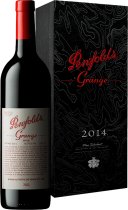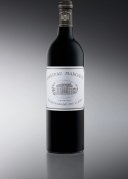Château d'Yquem Sauternes
Château d'Yquem is the indisputable worlds greatest sweet wine. This fact was known when the original 1855 classification of Sauternes was released and saw Château d'Yquem given a category all on its own, premier grand cru, which it still holds. Since 1593, only two families have owned the prestigious Château that sits in a commanding, fortress like, position overlooking most of Sauternes. Only highly skilled and permananent workers tend the vineyards that produce fruit of compelling concentration and intensity. The resulting wines can begin to be enjoyed after seven or eight years, but in good years, like the 2000 vintage, the wine can last much, much longer.
Related products
Penfolds Grange
Unmistakably, Grange, this 2012 vintage is complex, flamboyant and lifted. An aromatic multi-cultural characteristics. The earthiness is well integrated with the aromas of dark fruits, grounded coffee, red liquorice and black olives, which leads to a firmly structured finish.
Benjamin Leroux Grand Cru Echézeaux
Clarendon Hills Astralis Syrah
Clarendon Hills is the living vision of one of the world's greatest Shiraz winemakers, Roman Bratasiuk. The dream was realised in 1990 and is now home to some of the most outstanding and hard to get single vineyard wines in Australia. The Astralis is the flagship wine in the Clarendon Hills portfolio, and while this vineyard is not treated any differently to the others, it garners the most worldwide attention due to its incredible expression and timeless elegance. From an Easterly aspect and planted on a 45 degree ascending slope, Australis has phenomenal varietal length and will repay the patient cellarer for more than 15 years.
Château Margaux
A 1st Growth of the highest order, Château Margaux is one of the original 1st growths classified in the Médoc and is arguably the most important of the region. Producing only some 33,000 cases of predominantly Cabernet Sauvignon, Margaux consistently produces wines that are among the finest examples of the vintage. 2009 is regarded as one of the finest in recent memory in the region and 'normal' wines form the Margaux appellation are being heralded as truly exceptional. One can only speculate how magnificent the Château Margaux will be in 15-20 years time, if one can be patient enough!
Château l'Eglise-Clinet Pomerol
Château l'Eglise-Clinet is a much sought after Domaine within the right bank district of Bordeaux and can be hard to come by. A majority blend of Merlot to Cabernet delivers a wine of subtlety and plushness and due to the properties long planted vines, the ageability is second to none in the region. After not pulling out vines after the 1956 frost, this Château can boast some of the oldest vine material in Pomerol and that evidence can be found in the 2003 bottle of l'Eglise-Clinet which is still ageing gracefully in the bottle even after a difficult vintage due to heat.
Château Palmer Margaux
Château Palmer is considered one of the worlds first 'Super Seconds' (although actually classified as a third growth), a term relating to the top echelon of producers that fall outside of the ancient 1st Growth classification. Margaux's Château Palmer was named after a British general who fought under Wellington. It has been stated by quite a few wine critics that this could possibly be the finest Château Palmer ever produced. An amazing claim considering how phenomenal the 2005 was and is yet to be. Masses of concentrated aromas and flavours that will keep your senses entertained for hours on end. A truly remarkable achievement that will repay the patient cellarer over the next 30 years.
Chateau Haut-Brion
Château Ausone
Chappellet Pritchard Hill
This is a classic expression of mountain-grown Cabernet Sauvignon that combines exceptional structure and concentration with graceful purity and poise. The aromas reveal deep layers of blackberry, cassis and anise along with notes of cedar and violet. The palate is velvety and rich, with underlying tone and structure. Dark fruit flavors are accompanied by hints of roasted coffee, dark chocolate and oak spice that carry through to a long, satisfying finish.
Chappellet Cabernet Sauvignon Signature
Deep and rich, this is a classic expression of hillside Napa Valley Cabernet Sauvignon, offering alluring aromas of boysenberry, black currant, and dark chocolate, as well as subtle layers of sweet oak, savory herbs, and fresh-roasted coffee. On the palate, ripe fruit and plush, radiant tannins create a velvety mouthfeel and an almost liqueur-like richness that carries through to a long, lingering finish.



















































































